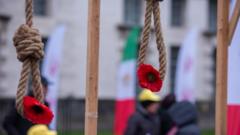In 2024, Iran's execution figures soared to at least 901, a 6% increase from the previous year and the highest in nine years, prompting urgent calls for a moratorium on capital punishment from UN officials. Most executions were for drug-related offenses, but the state has notably targeted dissidents following nationwide protests.
UN Reports Alarming Surge in Executions in Iran for 2024

UN Reports Alarming Surge in Executions in Iran for 2024
A staggering rise in executions marks the highest tally in nearly a decade, signaling a troubling trend in Iran's use of capital punishment, particularly targeting dissidents and ethnic minorities.
In a disturbing trend, the United Nations reported that Iran executed at least 901 individuals in 2024, marking the highest execution count in nearly a decade and reflecting a 6% increase from 2023. The UN human rights chief, Volker Türk, expressed grave concern over this year-on-year rise, emphasizing the urgent need for Iran to cease this alarming practice of capital punishment that disproportionately affects marginalized groups.
According to Türk, the majority of these executions were tied to drug-related offenses; however, a significant number of dissidents were also sentenced to death amidst ongoing crackdowns following the protests ignited in 2022. Furthermore, the data revealed an increase in the execution of women, with at least 31 losing their lives, the highest count documented by Iranian human rights monitors since they began tracking the practice.
Reports detailed that women were executed for various reasons, including the case of Leila Ghaemi, who killed her husband after discovering him and his associates sexually assaulting her young daughter. Many of the other women executed were similarly tied to drug offenses, raising alarms among human rights activists who argue that such crimes do not meet the threshold of "most serious crimes" required for the death penalty under international law.
A report by the Kurdish group Hengaw further underscored the disconcerting trend of targeting Iran's ethnic minorities, noting that over half of those executed originated from these communities, including 183 Kurds. The UN previously highlighted that the government has disproportionately cracked down on dissent, particularly against ethnic and religious minorities since the emergence of the "Woman, Life, Freedom" protests, which erupted in response to the death of a young Kurdish woman in police custody.
Additionally, reports from HRANA indicated that five juvenile offenders were among those executed, defying international prohibitions against capital punishment for individuals under 18 at the time of their offenses. Amnesty International's research indicated that Iran accounted for a staggering 74% of all documented executions globally in 2023, excluding China, which is believed to engage in thousands of executions annually but does not publicly disclose its figures.
In light of these troubling developments, Türk urged Iranian authorities to instate a moratorium on the death penalty, advocating for its eventual abolition in alignment with fundamental human rights principles. The international community continues to call for reform and an end to practices that violate the right to life.






















